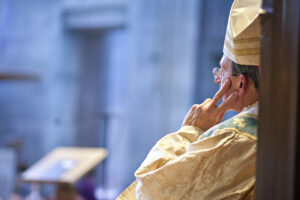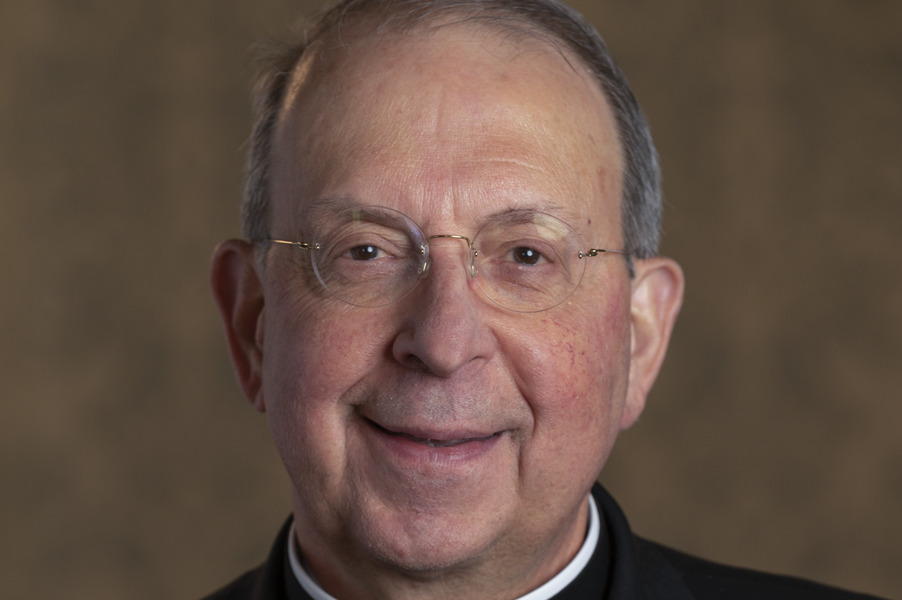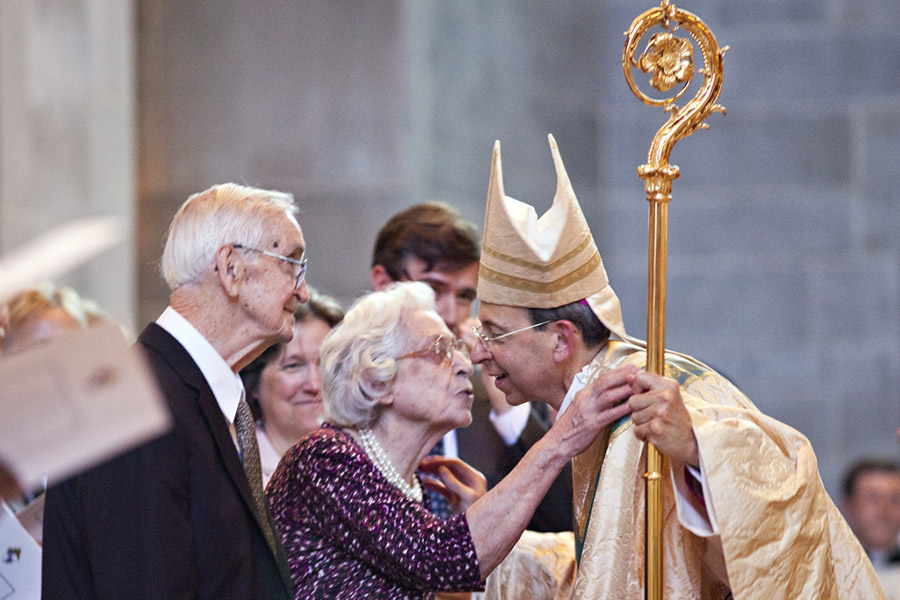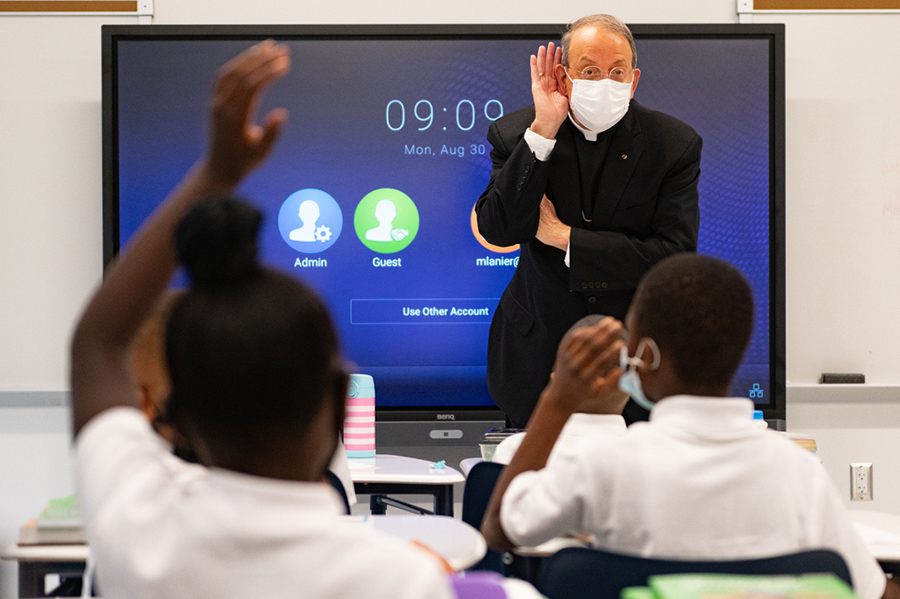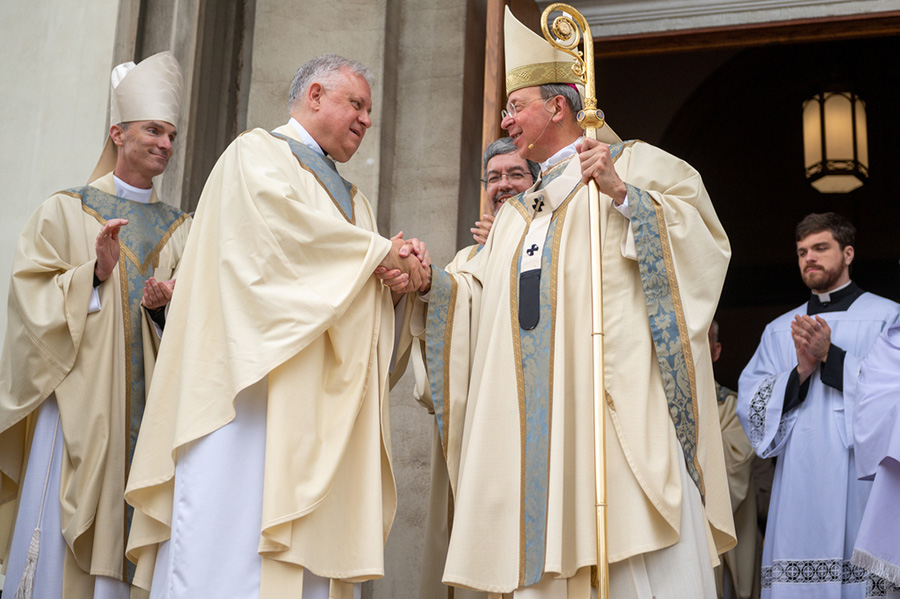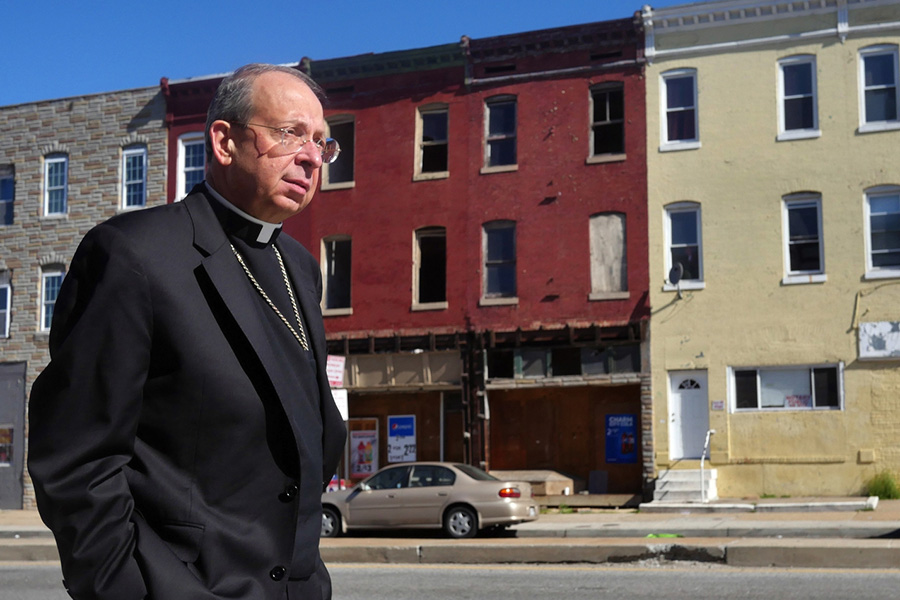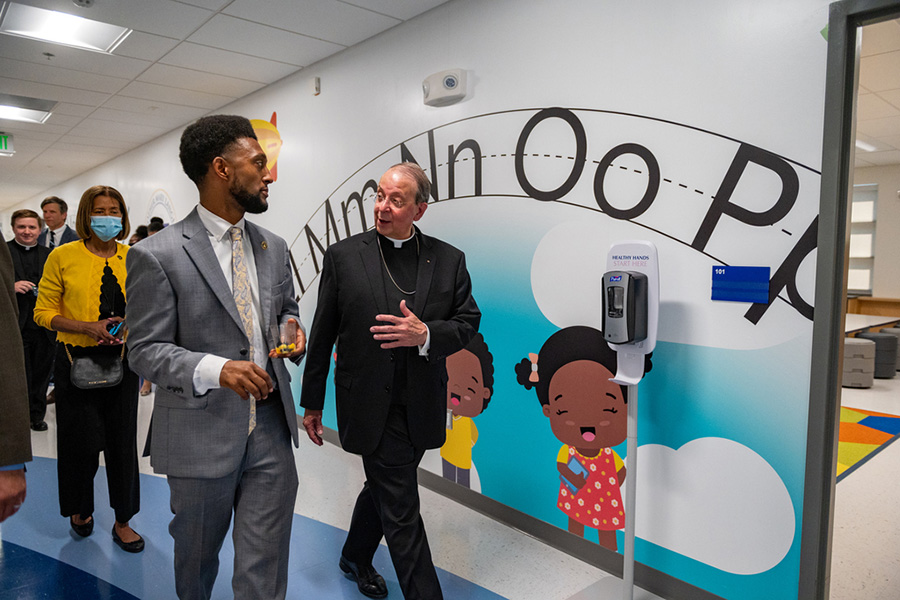Note: This is part of a package of editorial content celebrating the 10th anniversary of Archbishop William. E. Lori’s installation as archbishop of Baltimore and the 45th anniversary of his priestly ordination. Read all the stories here.
When bishops of dioceses want to communicate with their faithful, they have a variety of ways these days. In addition to homilies, many write columns for their diocesan publications. For more formal efforts regarding Catholic teaching and practice, bishops write pastoral letters to their people.
Archbishop William E. Lori has used all of these methods – and more – to ensure that Catholics in the Archdiocese of Baltimore know and understand his theology and pastoral priorities.
Early in his priestly career, he expected to become a professor of sacramental theology. “I got my doctorate, bought my books, had my lesson plans ready,” he said. But then he was named as priest-secretary and theologian to Washington Cardinal James A. Hickey.
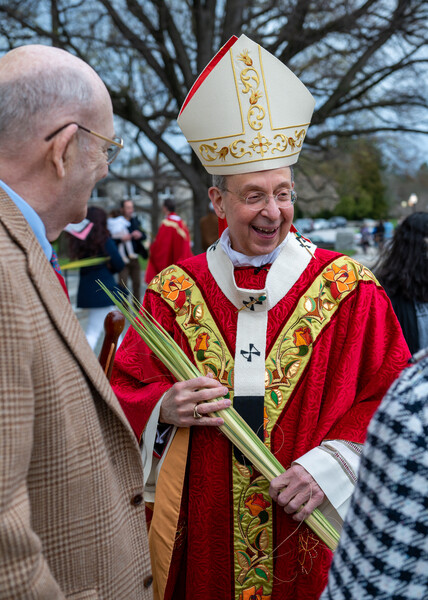
Since his appointment as 16th archbishop of Baltimore in 2012, Archbishop Lori has written one book, two pastoral letters – which carry a certain level of teaching – and two more pastoral reflections.
“The Joy of Believing: A Practical Guide to the Catholic Faith,” a book published in 2015, was the archbishop’s follow-up to Pope Francis’ first apostolic exhortation, “Evangelii Gaudium” (“The Joy of the Gospel.”
In his book, the archbishop followed the structure of the Compendium of the Catechism of the Catholic Church and explained what the Church believes and how we can best put those beliefs into practice in our everyday lives.
Each chapter included five questions upon which the reader could reflect. Among the topics covered are the Creed, the liturgy, the seven sacraments, the Ten Commandments and prayer in the Christian life.
In 2016, Archbishop Lori released his first pastoral letter in Baltimore, “A Light Brightly Visible: Lighting a Path to Missionary Discipleship,” in which he laid out his vision for parish pastoral planning in the light of evangelization and the call – emphasized by Pope Francis – to make local churches centers for helping others to become missionaries of Christ.
In the pastoral, the archbishop noted that the letter grew out of a series of talks he gave at regional meetings around the archdiocese.
He said that Pope Francis’ papacy stretched him and challenged him to test the quality of his own encounter with Christ.
“Pope Francis is asking me to accompany those I serve. One of his famous lines is that bishops should acquire ‘the smell of the sheep’ – and that means being with people, walking with people, caring about them, listening to them and asking questions,” he wrote.
“Pope Francis’ challenge to me as your bishop is even more thorough. He is challenging me to make evangelization that foundation of my entire ministry.”
The pastoral went on to define the ways a focus on missionary discipleship would shape the structure of parishes and parish ministry. Following the model he laid out, in the years since the pastoral was published parishes have been grouped into pastorates – a single parish or multiple parishes under one pastor and one leadership team. Some of these pastorates have formally merged into single parishes.
“I am hoping our decisions will ensure that parishes are centers of evangelization that connect people with the pastoral, educational, healthcare and social services that they need, with special help in living out the vocation of marriage and family,” the archbishop wrote.
Five years later, he updated that vision in “A Light Brightly Visible 2.0,” considering circumstances that affected parish life during the coronavirus pandemic. He also announced in that pastoral letter the formation of the Institute for Evangelization, which reshaped ministry at the archdiocesan level and established Emmaus Teams that support parishes in their efforts to make missionary disciples.
In the meantime, he had released two pastoral reflections on racial justice: “The Enduring Power of Dr. Martin Luther King Jr.’s Principles of Nonviolence” (2018) and “The Journey to Racial Justice: Repentance, Healing and Action” (2019).
In an interview with the Catholic Review in advance of his 10th anniversary as archbishop of Baltimore, Archbishop Lori said he thought the reaction to his two pastoral reflections addressing racial injustice has been generally positive.
“I think that the Martin Luther King pastoral was well received, not only because it held up a great and prophetic leader in our culture – a religious and civil leader in our culture – but also because his approach, the nonviolent approach, is hugely important for the times in which we live, times that are so polarized and angry and oftentimes violent,” the archbishop said. “Martin Luther King’s words from more than 50 years ago resonate now as much as they did when he spoke them, maybe even more.
In his 2019 pastoral reflection, he acknowledged “the church’s historical involvement in a society in which the institution of slavery was deeply embedded” and the reality of the church’s direct involvement in slavery.
“When the State of Maryland was in its infancy, Catholics, including both clergy and laity, allowed the mantle of the society in which they lived to supersede the fundamental tenet of their faith: all of us are children of God, all are redeemed by Christ,” the archbishop wrote in the 2019 reflection. “Among them were four of the first Roman Catholic bishops in Maryland – Archbishops John Carroll, Leonard Neale, Ambrose Maréchal and Samuel Eccleston – who openly participated in the institution of enslavement.” Previously published research indicates that at least Archbishops Carroll, Maréchal and Eccleston possessed enslaved persons, which included making provisions for their manumission or sale.
In the 2022 interview, Archbishop Lori said, “In terms of ‘The Journey to Racial Justice,’ I think that there was a recognition that the church was trying to not only own up to its teaching, but also own up to its past, and to learn from that past. As a result of that, a racial justice working group was formed and that group expanded and intensified its work after the issuance of that pastoral letter. A Racial Justice Coordinating Council, which emerged from the working group, will consult with people in parishes and schools and other experts to implement recommendations in communications, formation, representation, restorative and social justice, and clergy personnel.
Archbishop Lori released two more reflections of significance.
In July 2018, he issued a reflection, “Celebrating the Marriage of Love and Life:
A Reflection on the 50th Anniversary of ‘Humanae Vitae.’”
He noted that Blessed Pope Paul VI’s encyclical regarding marriage and sexuality “upheld the Catholic Church’s responsibility to proclaim God’s Truth even when it is unpopular.”
He wrote, “As one who is regularly around our ‘young Church,’ I am encouraged by their openness and renewed excitement and commitment to Jesus Christ and His Church and their desire for more authentic relationships.” He added that the church calls “all of us: to live and love more faithfully, generously and joyfully.”
In October 2018, after a Pennsylvania Grand Jury report about clergy sexual abuse in that state and revelations that a former archbishop of Washington, Theodore McCarrick, had been removed from ministry by the Holy See, Archbishop Lori wrote “Missionary Disciples in Crisis.”
In that reflection, he acknowledged the sin of clergy sexual abuse, and pointed out ways the chruch had attempted to respond to the scandals since the passage by the U.S. bishops of the Charter for the Protection of Children and Young People.
“The current situation is painful for a host of reasons. We weep for the survivors of abuse and seek justice, but we are also forced to look at such brokenness wherein the church’s body is turned in against itself,” he wrote at the time.
For texts of Archbishop Lori’s pastoral letters and reflections, visit bitly.com/archbishop-pastorals
Email Christopher Gunty at editor@CatholicReview.org
Read More Archbishop Lori Milestones
Copyright © 2022 Catholic Review Media
